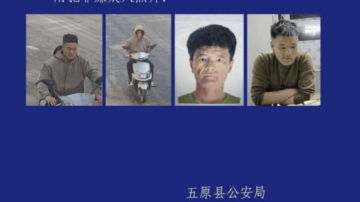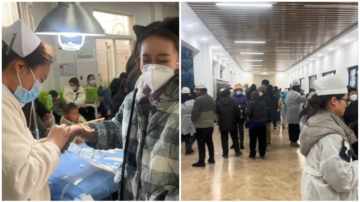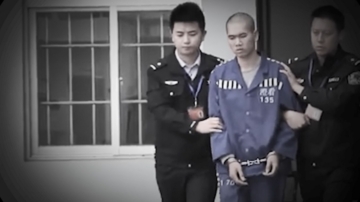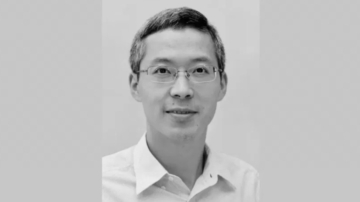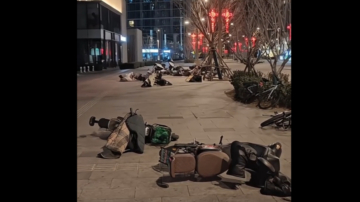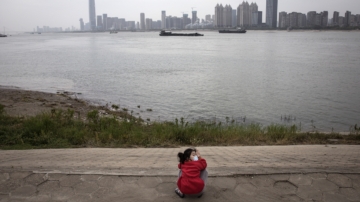【新唐人2013年01月07日訊】近年來,中國大陸因為強行徵用土地而引發的暴力事件不斷上演,造成民怨沸騰、民間抗暴此起彼伏。最近大陸媒體報導,今年全國兩會前後,當局將會頒布一份城鎮化建設規劃,涉及眾多大型城市群的建設。外界解讀認為,這意味著城市化規模的加大和更多失地農民的出現,如果當局不對土地和戶籍制度作根本改變,這一規劃將會使很多問題越發尖銳。
大陸《經濟觀察報》報導,由國家發改委牽頭,財政部、國土資源部、住建部等十多個部委,參與編製的《全國促進城鎮化健康發展規劃(2011-2020年)》,將於今年全國兩會前後對外頒布。這一規劃將涉及全國20多個城市群、180多個地級以上城市和1萬多個城鎮的建設。
《規劃》宣稱,當局將在東部地區優化提升京津冀、長三角和珠三角城市群,使其具有國際競爭力﹔在中西部資源較好的地區,培育壯大若干城市群。
報導說,從1978年到2011年,大陸城鎮人口從1.72億增加到6.9億,城鎮化率從17.92%提升到51.27%。但2.6億農民工,沒有城鎮戶籍、享受不到教育、醫療和社會保障, 真正在城市購房的還不足1%。城鎮化建設背後潛藏的諸多矛盾日益凸顯,包括城市交通擁堵、住房緊張、環境污染、事故災害等,而其中最為突出的是戶籍和土地問題。
對此,北京《國情內參》期刊首席研究員鞏勝利向《新唐人》表示,在西方國家,土地是農民私有財產,而在中國,農民對土地只有一定的使用權。因此在城市化過程中,政府把農民土地強行徵用為城市商業用地,然後高價拍賣獲取暴利。各級政府成為「土地財政」的最大受益者,而被剝奪土地的農民卻陷於極其艱難的境地。
北京《國情內參》期刊首席研究員鞏勝利:「比如像廣州,最大的一個懸而未決的問題就是廣州的大學城。大學城蓋起來以後,很多失地農民在那抗議,而且搭起了窩棚。幾百戶、幾千戶成片成片的呆在那裡,尋找生存之路。」
據河南一名王姓農民講述,他自己村裡的土地,就被當地政府以一萬多元的低價強行占有,雖然多方投訴,但無人受理。
河南農民王先生:「強佔去了,他們倒賣了一、二百萬一畝、最賤的也是70萬。我們農民確實被這個政府搞得暈頭轉向,農民跟政府現在是勢不兩立。」
王先生表示,十八大之後,當局說是要監督土地徵用,但到底結果如何,目前還是未知數。
河南農民王先生:「能不能落實到實際。看我們遭受的痛苦,了解了解我們農民的怨言,甚麼怨言,為啥有怨言,為啥對政府那麼多怨言,那麼多痛恨。」
針對中國城鎮化的難題,一些專家認為,現行的土地和戶籍制度是兩個繞不開的障礙。戶籍、土地制度要同步進行改變,讓長期在城市打工的農民工市民化,同時提高農村徵地補償,破除政府壟斷徵地,讓土地收益更多進入農民口袋。
鞏勝利則指出,在正常的市場經濟中有運動員和裁判員,兩者不能混淆。而在中國,政府既是運動員又是裁判員。目前還看不出當局有任何舉措來保障失地農民的權益。
鞏勝利:「如果市場經濟的機制不能得以實行,那麼中國的市場經濟亂局會更深入的發展,而且這種亂局還會持續的發酵,甚至擴大、普遍化,使中國可能出現更大的危局。」
鞏勝利強調,由於中共不允許任何不同聲音的存在,造成當今中國的生態環境最為嚴峻。從人類生存的人文、社會、和大自然空間來看,中國的問題最嚴重,是所有國家裡絕無僅有的。
採訪/朱智善 編輯/李謙 後製/王明宇
Urbanization Plan Aggravates Land and Residency Issues
Many violent events occur in China due to increasing anger
and civil uprising caused by forcible land acquisition.
It is reported that around the Two meetings (annual meetings
of the National People's Congress and Chinese People's
Political Consultative Conference), urbanization plans will be issued.
It is believed that this action will only result in more
landless peasants.
Social problems related to household registration
will also intensify.
The Economic Observer (a Chinese weekly) reported that
the 2011-2020 urbanization plan led by the National Development
and Reform Commission will be issued around the Two meetings.
This program will involve more than 20 urban areas,
180 districts, and more than 10,000 towns.
It has been claimed the plan will upgrade the international
competitiveness of urban areas such as Beijing, Tianjin,
the Yangtze River Delta and Pearl River Delta
of eastern China.
It will also foster urbanization in the resourceful
midwest area.
Urban population was reported to increase from 172 million
to 690 million, and urbanization rate from 17.92% to 51.27%, between 1978 and 2011.
However, less than 1% of the 260 million migrant workers
owned a house in the city.
Majority of them are not entitled to urban residency,
education, health care and social security.
Problems behind urbanization such as traffic, housing,
pollution, accidents and disasters, are only getting prominent.
Among them, household registration and land usage
are the most pressing issues.
Gong Shengli, a Beijing based newsrefer.com researcher
told the New Tang Dynasty TV that land in China is right to use but not ownership as in the Western countries.
During the urbanization, the authorities reap huge profits
through forcibly expropriate the land from farmers and commercialize it from high-priced auction.
Local governments become the biggest beneficiary of
the land and leave the deprived farmers in the most difficult situation.
Newsrefer.com researcher Gong Shengli:
"Take Guangzhou as an example.
The most outstanding issue is the Campus City.
The landless farmers protest in the Campus City after
it's built.
Hundreds and thousands of the landless farmers gather there
in clusters in the temporary shelters and try to survive."
A Henan farmer, Mr. Wang, spoke to the local government
of his village which forcibly occupied the land
in the village at a low base price of 10,000 yuan.
Yet, complaints were not accepted anywhere.
Henan Farmer Mr. Wang: "They resold the land at a
minimum of 700,000 yuan, and even at two million an acre.
They have fooled the farmers.
We and the government are irreconcilable."
Mr. Wang said it is claimed that after the 18th National
Congress, the authorities will oversee the acquisition of land. But he suspects the result.
Henan farmer Mr. Wang: "Is it going to work?
They need to know our suffering, understand our complaints,
and learn why there's so much complaint
and hatred of the government."
The problems of urbanization in China are believed to exist
in the systems of land and household registration.
Reform of both the household registration
and the land system must go hand in hand.
That is to allow residency of the migrant workers,
to improve rural land requisition compensation,
to cut government monopoly of land acquisition,
and to allow land revenue to go to the farmers.
Gong Shengli indicated that the identities of athletes
and referees in a normal market economy cannot be confused.
In China, the government is both the player and the referee,
yet there's no protection of landless peasants.
Gong Shengli: "If the mechanisms of the market economy
cannot be implemented, China's market economic chaos will continue and even expand into a critical situation for China."
Gong Shengli stressed that the Chinese Communist Party
has created the harshest environment by not allowing a second voice.
China is experiencing the most serious problems in
humanities, society, and nature among all countries.
大陸《經濟觀察報》報導,由國家發改委牽頭,財政部、國土資源部、住建部等十多個部委,參與編製的《全國促進城鎮化健康發展規劃(2011-2020年)》,將於今年全國兩會前後對外頒布。這一規劃將涉及全國20多個城市群、180多個地級以上城市和1萬多個城鎮的建設。
《規劃》宣稱,當局將在東部地區優化提升京津冀、長三角和珠三角城市群,使其具有國際競爭力﹔在中西部資源較好的地區,培育壯大若干城市群。
報導說,從1978年到2011年,大陸城鎮人口從1.72億增加到6.9億,城鎮化率從17.92%提升到51.27%。但2.6億農民工,沒有城鎮戶籍、享受不到教育、醫療和社會保障, 真正在城市購房的還不足1%。城鎮化建設背後潛藏的諸多矛盾日益凸顯,包括城市交通擁堵、住房緊張、環境污染、事故災害等,而其中最為突出的是戶籍和土地問題。
對此,北京《國情內參》期刊首席研究員鞏勝利向《新唐人》表示,在西方國家,土地是農民私有財產,而在中國,農民對土地只有一定的使用權。因此在城市化過程中,政府把農民土地強行徵用為城市商業用地,然後高價拍賣獲取暴利。各級政府成為「土地財政」的最大受益者,而被剝奪土地的農民卻陷於極其艱難的境地。
北京《國情內參》期刊首席研究員鞏勝利:「比如像廣州,最大的一個懸而未決的問題就是廣州的大學城。大學城蓋起來以後,很多失地農民在那抗議,而且搭起了窩棚。幾百戶、幾千戶成片成片的呆在那裡,尋找生存之路。」
據河南一名王姓農民講述,他自己村裡的土地,就被當地政府以一萬多元的低價強行占有,雖然多方投訴,但無人受理。
河南農民王先生:「強佔去了,他們倒賣了一、二百萬一畝、最賤的也是70萬。我們農民確實被這個政府搞得暈頭轉向,農民跟政府現在是勢不兩立。」
王先生表示,十八大之後,當局說是要監督土地徵用,但到底結果如何,目前還是未知數。
河南農民王先生:「能不能落實到實際。看我們遭受的痛苦,了解了解我們農民的怨言,甚麼怨言,為啥有怨言,為啥對政府那麼多怨言,那麼多痛恨。」
針對中國城鎮化的難題,一些專家認為,現行的土地和戶籍制度是兩個繞不開的障礙。戶籍、土地制度要同步進行改變,讓長期在城市打工的農民工市民化,同時提高農村徵地補償,破除政府壟斷徵地,讓土地收益更多進入農民口袋。
鞏勝利則指出,在正常的市場經濟中有運動員和裁判員,兩者不能混淆。而在中國,政府既是運動員又是裁判員。目前還看不出當局有任何舉措來保障失地農民的權益。
鞏勝利:「如果市場經濟的機制不能得以實行,那麼中國的市場經濟亂局會更深入的發展,而且這種亂局還會持續的發酵,甚至擴大、普遍化,使中國可能出現更大的危局。」
鞏勝利強調,由於中共不允許任何不同聲音的存在,造成當今中國的生態環境最為嚴峻。從人類生存的人文、社會、和大自然空間來看,中國的問題最嚴重,是所有國家裡絕無僅有的。
採訪/朱智善 編輯/李謙 後製/王明宇
Urbanization Plan Aggravates Land and Residency Issues
Many violent events occur in China due to increasing anger
and civil uprising caused by forcible land acquisition.
It is reported that around the Two meetings (annual meetings
of the National People's Congress and Chinese People's
Political Consultative Conference), urbanization plans will be issued.
It is believed that this action will only result in more
landless peasants.
Social problems related to household registration
will also intensify.
The Economic Observer (a Chinese weekly) reported that
the 2011-2020 urbanization plan led by the National Development
and Reform Commission will be issued around the Two meetings.
This program will involve more than 20 urban areas,
180 districts, and more than 10,000 towns.
It has been claimed the plan will upgrade the international
competitiveness of urban areas such as Beijing, Tianjin,
the Yangtze River Delta and Pearl River Delta
of eastern China.
It will also foster urbanization in the resourceful
midwest area.
Urban population was reported to increase from 172 million
to 690 million, and urbanization rate from 17.92% to 51.27%, between 1978 and 2011.
However, less than 1% of the 260 million migrant workers
owned a house in the city.
Majority of them are not entitled to urban residency,
education, health care and social security.
Problems behind urbanization such as traffic, housing,
pollution, accidents and disasters, are only getting prominent.
Among them, household registration and land usage
are the most pressing issues.
Gong Shengli, a Beijing based newsrefer.com researcher
told the New Tang Dynasty TV that land in China is right to use but not ownership as in the Western countries.
During the urbanization, the authorities reap huge profits
through forcibly expropriate the land from farmers and commercialize it from high-priced auction.
Local governments become the biggest beneficiary of
the land and leave the deprived farmers in the most difficult situation.
Newsrefer.com researcher Gong Shengli:
"Take Guangzhou as an example.
The most outstanding issue is the Campus City.
The landless farmers protest in the Campus City after
it's built.
Hundreds and thousands of the landless farmers gather there
in clusters in the temporary shelters and try to survive."
A Henan farmer, Mr. Wang, spoke to the local government
of his village which forcibly occupied the land
in the village at a low base price of 10,000 yuan.
Yet, complaints were not accepted anywhere.
Henan Farmer Mr. Wang: "They resold the land at a
minimum of 700,000 yuan, and even at two million an acre.
They have fooled the farmers.
We and the government are irreconcilable."
Mr. Wang said it is claimed that after the 18th National
Congress, the authorities will oversee the acquisition of land. But he suspects the result.
Henan farmer Mr. Wang: "Is it going to work?
They need to know our suffering, understand our complaints,
and learn why there's so much complaint
and hatred of the government."
The problems of urbanization in China are believed to exist
in the systems of land and household registration.
Reform of both the household registration
and the land system must go hand in hand.
That is to allow residency of the migrant workers,
to improve rural land requisition compensation,
to cut government monopoly of land acquisition,
and to allow land revenue to go to the farmers.
Gong Shengli indicated that the identities of athletes
and referees in a normal market economy cannot be confused.
In China, the government is both the player and the referee,
yet there's no protection of landless peasants.
Gong Shengli: "If the mechanisms of the market economy
cannot be implemented, China's market economic chaos will continue and even expand into a critical situation for China."
Gong Shengli stressed that the Chinese Communist Party
has created the harshest environment by not allowing a second voice.
China is experiencing the most serious problems in
humanities, society, and nature among all countries.

